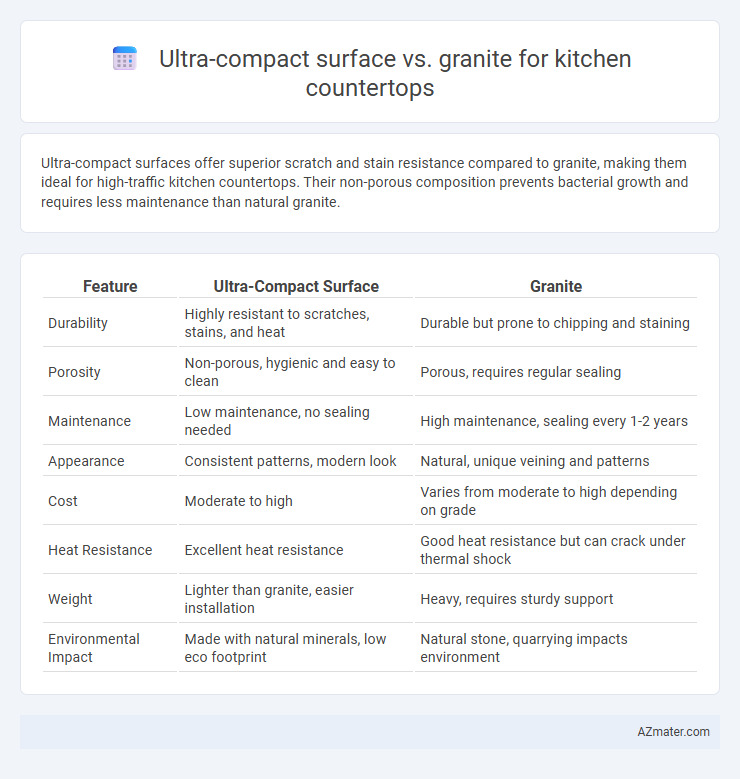Ultra-compact surfaces offer superior scratch and stain resistance compared to granite, making them ideal for high-traffic kitchen countertops. Their non-porous composition prevents bacterial growth and requires less maintenance than natural granite.
Table of Comparison
| Feature | Ultra-Compact Surface | Granite |
|---|---|---|
| Durability | Highly resistant to scratches, stains, and heat | Durable but prone to chipping and staining |
| Porosity | Non-porous, hygienic and easy to clean | Porous, requires regular sealing |
| Maintenance | Low maintenance, no sealing needed | High maintenance, sealing every 1-2 years |
| Appearance | Consistent patterns, modern look | Natural, unique veining and patterns |
| Cost | Moderate to high | Varies from moderate to high depending on grade |
| Heat Resistance | Excellent heat resistance | Good heat resistance but can crack under thermal shock |
| Weight | Lighter than granite, easier installation | Heavy, requires sturdy support |
| Environmental Impact | Made with natural minerals, low eco footprint | Natural stone, quarrying impacts environment |
Introduction: Comparing Ultra-Compact Surface and Granite Countertops
Ultra-compact surfaces offer superior durability, resistance to scratches, stains, and heat compared to natural granite countertops, making them ideal for high-use kitchen environments. Granite provides a unique, natural aesthetic with varied patterns and colors, but requires regular sealing to maintain its integrity. Both materials deliver long-lasting performance, with ultra-compact surfaces excelling in low maintenance and consistency, while granite appeals to those seeking natural stone's classic beauty.
Material Composition and Structure
Ultra-compact surfaces for kitchen countertops are composed of a mixture of natural minerals, quartz, and pigments fused under extreme heat and pressure, resulting in a highly dense, non-porous, and scratch-resistant material. Granite is a natural igneous rock formed from crystallized magma, characterized by its granular and porous structure, requiring sealing to prevent stains and damage. The engineered composition of ultra-compact surfaces provides superior durability and hygiene compared to the natural variability and maintenance needs of granite countertops.
Aesthetic Options and Design Versatility
Ultra-compact surfaces offer a wider range of aesthetic options, including sleek matte, glossy finishes, and diverse colors, patterns, and textures that mimic natural stone or metal, enhancing design versatility in modern kitchens. Granite, while limited to natural stone patterns and color variations, provides unique, organic veining and a luxurious appearance that can complement classic or rustic kitchen styles. The non-porous nature and customizable sizes of ultra-compact surfaces allow for seamless installations and creative edge details, giving designers greater flexibility compared to granite countertops.
Durability and Resistance to Damage
Ultra-compact surfaces, composed of materials like sintered quartz or porcelain, exhibit exceptional resistance to scratches, stains, and heat, often outperforming granite in longevity and low maintenance. Granite, while naturally durable and resistant to moderate heat and scratches, requires periodic sealing to prevent staining and damage from acidic substances. The non-porous nature of ultra-compact surfaces provides superior protection against bacterial growth and impact damage, making them a highly durable choice for kitchen countertops.
Maintenance and Cleaning Requirements
Ultra-compact surfaces, composed of dense materials like porcelain and quartz, offer exceptional resistance to stains, scratches, and heat, making them easier to maintain compared to granite. Granite countertops require periodic sealing to prevent absorption of liquids and stains, alongside careful cleaning with pH-balanced products to preserve the stone's natural finish. Ultra-compact surfaces can be cleaned effectively with mild detergents and are less prone to harboring bacteria, providing a more hygienic and low-maintenance option for kitchen countertops.
Cost Comparison: Upfront and Long-Term
Ultra-compact surfaces generally have a higher upfront cost than granite, often ranging from $70 to $120 per square foot compared to granite's $40 to $80 per square foot. However, ultra-compact materials offer superior durability, low maintenance, and resistance to stains and heat, which can reduce long-term expenses related to repairs and replacements. Granite countertops may require periodic sealing and are more prone to chipping or staining, potentially increasing maintenance costs over time.
Installation Process and Considerations
Ultra-compact surfaces offer a lighter weight and thinner profile compared to granite, simplifying the installation process and reducing the need for additional structural support. Granite countertops require precise measuring and sealing, whereas ultra-compact materials are pre-sealed and resistant to stains, minimizing post-installation maintenance. Both options demand professional installation for optimal results, but ultra-compact surfaces allow for quicker fitting and easier handling due to their uniform thickness and strength.
Environmental Impact and Sustainability
Ultra-compact surfaces for kitchen countertops offer enhanced sustainability due to their lower resource consumption and longer lifespan compared to traditional granite, which requires extensive quarrying and energy-intensive processing. Ultra-compact materials typically incorporate recycled content and generate less waste during production, contributing to a smaller carbon footprint. Granite's natural extraction disrupts ecosystems and demands significant water and energy use, making ultra-compact surfaces a more environmentally responsible choice for eco-conscious kitchens.
Pros and Cons: Ultra-Compact Surface vs Granite
Ultra-compact surfaces offer superior durability, resistance to scratches, stains, and heat, making them ideal for heavy kitchen use, while granite provides natural beauty and unique patterns with hybrid benefits of heat resistance and durability. Ultra-compact materials require less maintenance and are non-porous, reducing bacterial growth compared to granite, which demands regular sealing to prevent staining and moisture damage. Cost-wise, ultra-compact surfaces tend to be more expensive upfront but offer better long-term value through toughness, whereas granite offers a classic, elegant look at varying price points depending on rarity and origin.
Which Countertop is Right for Your Kitchen?
Ultra-compact surfaces offer exceptional durability, stain resistance, and a wide variety of colors and patterns, making them ideal for high-traffic kitchens seeking a modern aesthetic. Granite countertops provide natural beauty with unique veining and heat resistance but require regular sealing to maintain their appearance and prevent staining. Choosing the right countertop depends on your preference for maintenance levels, design versatility, and long-term durability in your kitchen environment.

Infographic: Ultra-compact surface vs Granite for Kitchen countertop
 azmater.com
azmater.com